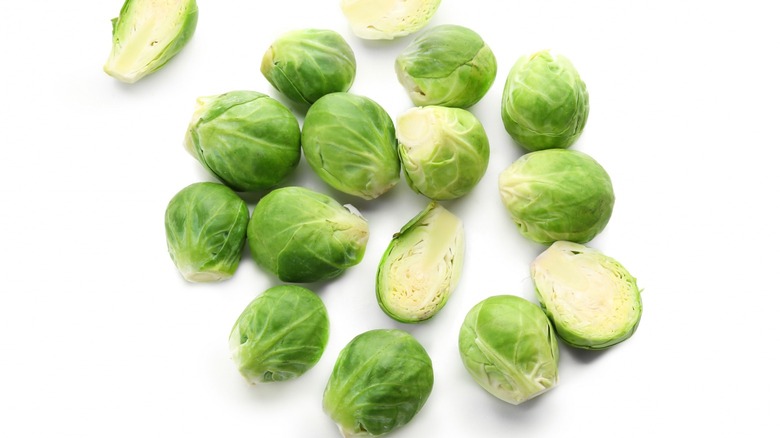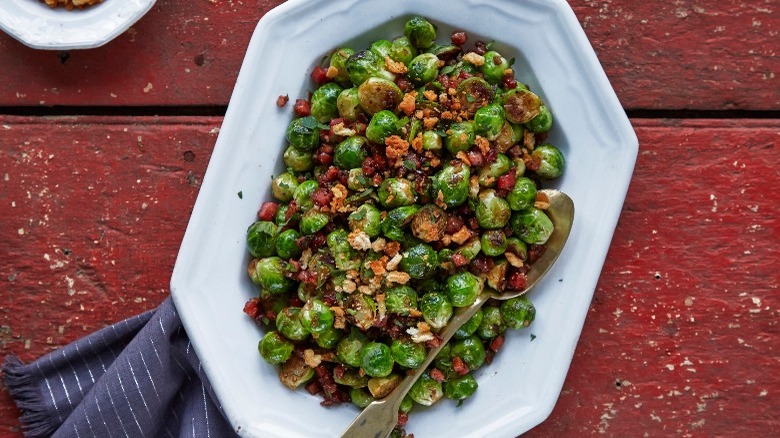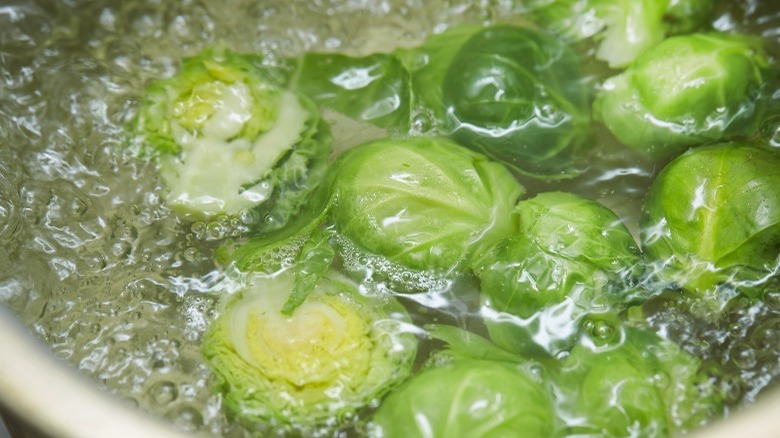Why You Should Parboil Your Brussels Sprouts In Salt Water
It's been a long road for the Brussels sprout from its much-maligned reputation as a bitter, overcooked mush monster to its reemergence in recent years as the versatile belle of the veggie ball. Equally delicious when fired up on the grill, roasted with honey and spicy hot harissa, or paired with pancetta and chestnuts, as they are when eaten raw, like in this Brussels sprout slaw recipe, these edible buds from the Brassicaceae family not only offer a nutty sweetness when prepared properly, they pack a nutritional wallop as well.
According to Healthline, Brussels sprouts are loaded with fiber and a good source of vitamins K (91% DV) and C (53% DV,) and even contain alpha-linolenic acid, an omega-3 fatty acid. And like the rest of their cruciferous family, Brussels sprouts may even help combat blood sugar issues. Healthline reports that several studies have found that eating more cruciferous vegetables, like Brussels sprouts, is linked to a lower risk of diabetes.
With a nutritional profile like that, it's no wonder everyone wants to work these baby cabbage heads into their diet. But what about their bitter bite?
Brussels bitter bite
Part of the Brussels sprouts' previous disgrace lies in its natural bitterness. Though modern varieties are toned down from their ancestral past (per NPR), like its other cruciferous brethren, Brussels sprouts contain a sulfuric phytochemical known as glucosinolate (via the Harvard School of Public Health), which gives these veggies their decidedly gassy odor and bitter bite. And while many home cooks and chefs alike will employ their favorite tricks — brown sugar, balsamic glaze, Worcestershire sauce — for masking any bitter aftertaste, there is a case to be made for developing your bitter palate as well.
But when it comes to Brussels sprouts, you don't really need to worry about hiding their bitterness, if you follow one golden rule — don't overcook them. According to Harvard's School of Public Health, Brussels sprouts' unpleasant flavor and smell are intensified when they are overcooked, especially when boiled. So, boiling is off the table — but parboiling and blanching are not.
Brussels sprouts — Hold the bitter
Want to make the most of your sprouts and cut their cooking time? Parboil them in salted water. Both Martha Stewart and Gordon Ramsay tout this cooking hack, advising us to trim and halve the Brussels sprouts, before tossing them in salted boiling water for 2 minutes and then roasting or sautéing them with their final flavors. Livestrong reports that Executive Chef, Saul Montiel, of Cantina Rooftop recommends this very same method to reduce the bitterness of Brussels.
Be sure to stick to that 2-minute mark to avoid the bitterness that boiling fully brings. Livestrong says, "Watch them closely during the cooking process, testing them periodically with a fork." The website explains that you want to heat your Brussels sprouts the whole way through but they should still be firm when they are removed from the water.
Beyond bitterness, parboiling your sprouts can speed up cooking times, softening the leaves to tender, right down to their core (without turning them to mush) and making it easy for you to focus on perfectly crispy and caramelized sprouts in less time in the oven, sauté pan, or out on the grill.


